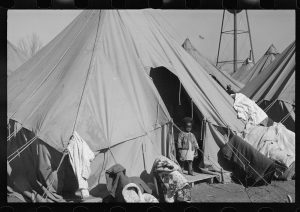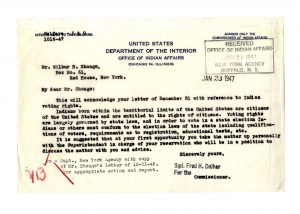What were Johnny Cash’s contributions to United States and Arkansas history and culture?
Subject(s): Arkansas History, Arts, Civics & Government, Native Americans, and US History
Time Period(s): (1929-1945) Great Depression and World War II, (1945-Early 1970s) Postwar United States, and (1968 to the Present) Contemporary United States
Grade level(s): 9-12
Supporting question(s):
Who was Johnny Cash?
How did the Great Depression and growing up in Arkansas influence the life and music of Johnny Cash?
What responsibilities do celebrities have to speak about social issues?
Source Set
- Portrait of Johnny Cash
- Young flood refugee in the camp at Forrest City, Arkansas
- “Five Feet High and Rising” by Johnny Cash
- Letter to Wilbur H. Shongo from Fred H. Dalker about American Indian Voting Rights
- The Pea Pickers Picayune
Description
Portrait from a magazine shoot of Johnny Cash behind his boyhood home in Dyess, Arkansas
Description
Photograph of a child in the refugee camp for victims of the 1937 flood located at Forrest City, Arkansas, in 1937.
Description
The song “Five Feet High and Rising” was written by Johnny Cash and released in September 1959 on the album Songs of our Soil.
Description
The document is a typed letter from Fred H. Dalker, who is responding to a question about Native American voting rights, to Wilbur Shongo. The letterhead is from the Department of Indian Affairs in Chicago, IL.
Description
The document is a typed newsletter for the inmates of Cummins Prison in Grady, Arkansas. The newsletter, title The Pea Pickers Picayune, is dated April 10, 1969. A black and white drawing of Johnny Cash is in the center of the page with text surrounding it.
Additional resource(s):
Prezi: The Great Depression in Arkansas
Encyclopedia of Arkansas: Johnny Cash
Native American Rights and Johnny Cash PowerPoint from UALR Center for History and Culture
Prison Reform and Johnny Cash PowerPoint from UALR Center for History and Culture
Arkansas Frameworks(s):
United States History
Era8.3.USH.1 Analyze national and international causes of the Great Depression (e.g., political decisions, protectionism, speculation, world gold standard, tariffs, unemployment, environment)
Era8.3.USH.4 Evaluate the changing role of the federal government between 1929 and 1945 and the changing views of Americans toward the role of government from multiple perspectives using primary and secondary sources
Era9.6.USH.1 Analyze the roles of individuals, groups, and the government in securing civil rights during the mid-20th century using a variety of primary and secondary sources (e.g., minorities, women, NAACP, federal court cases, legislation, Twenty-fourth Amendment)
Civics
PD.3.C.1 Evaluate rights and responsibilities of citizens in the United States
PD.4.C.5 Assess the effects of civil rights legislation on society in the United States (e.g., affirmative action, American Disabilities Act, Civil Rights Act 1964, Voting Rights Act 1965, modern civil rights movements)
Arkansas History
Era4.4.AH.9-12.4 Examine responses to natural disasters in Arkansas over time, using multiple sources (e.g., flooding, drought, disease)
Era4.4.AH.9-12.5 Analyze social, economic, and political effects of the Great Depression on various regions and segments of the population in Arkansas
Era4.4.AH.9-12.6 Analyze social, economic, and political effects of the New Deal on various regions and segments of the population in Arkansas





